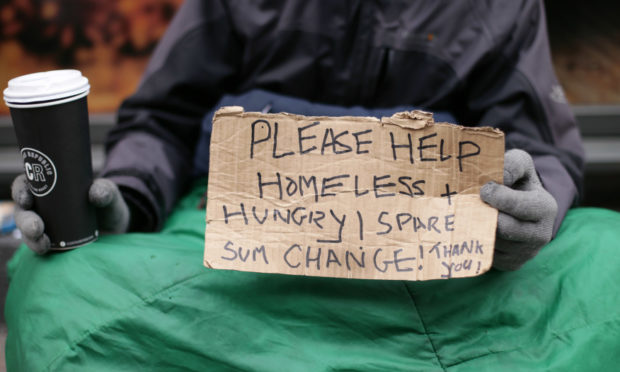A charity has warned the impact of Covid-19 on homelessness will be felt “for some time” yet amid an apparent increase in demand for help.
There were 164 applications for homelessness support made to Aberdeen City Council in June – the largest single-month figure for more than a year.
And while it is not known how many of these could be directly attributed to the pandemic, issues including relationship breakdowns and housing disputes are likely to have contributed.
The Aberdeen Citizens Advice Bureau (Cab) has been offering advice by telephone and e-mail in recent months, covering a wide range of subjects.
Manager Kristi Kelly says coronavirus has led to many difficulties in people’s lives.
“We have seen relationship breakdowns, both with couples and parents with adult children,” she said.
“Someone says they need their own space and asks them to move out.
“There have also been more cases of domestic violence in the last three months, compared to the same time last year, which is a real shame.
“Some landlords have decided they want to move back into a property or sell it, and that means a family has to find somewhere else to live – which has been difficult during lockdown.”
When people contact Aberdeen Cab with difficulties regarding homelessness, advisers are able to point them in the direction of further support and offer assistance in terms of ensuring they know their rights.
In March homelessness charity Aberdeen Cyrenians launched its AC2U service to deliver food, toiletries, baby items and clothing to those in hardship.
Mike Burns, Aberdeen Cyrenians chief executive, said it was therefore “not surprising” that the organisation has experienced an increase in demand during recent months.
He said: “Many things impact homelessness, and with so much uncertainty and change with Brexit, the fluctuating oil and gas price and now coronavirus, there is a lot of upheaval in the north-east.
“We have seen a rise in the number of people accessing our services since Covid-19 hit but, as we set up a dedicated emergency response service designed to support vulnerable people during this time, that’s not unsurprising.
“We believe the full impact of coronavirus will continue to be felt for some time to come and are prepared to help an increasing number of people in crisis should the need arise.”
However, Mr Burns said the recent month-on-month increase in homelessness applications may not be “indicative of a longer-term trend” due to constant fluctuations in the numbers.
There were 105 made in February, before lockdown was imposed, increasing gradually to 164 in June.
During this period there were 629 applications submitted to Aberdeen City Council – only three more than the same period in 2019.
But when comparing just April to June 2020 to the same three months last year, there was a 14% increase.
Year-on-year, however, these figures have been decreasing overall.
Mr Burns said: “The number of cases of homelessness tends to vary and peak during particular times of the year, and while these latest figures are compelling, it’s too early to say whether this is indicative of a longer term trend.”
Local authorities elsewhere have experienced less fluctuation regarding these figures.
In March, the month lockdown was imposed, there were 41 applications in Moray. This dropped to 25 in April, but rose to 29 then 33 in the following months.
There was a similar trend in Aberdeenshire, with cases dropping from 98 in March to 62 in April, then appearing to level off at 73 and 74 over May and June.
Both councils’ figures for the most recent three months were lower than at any other point in the last year.
Numbers remained relatively consistent in Orkney, Shetland and the Western Isles, while Highland Council was unable to provide statistics.
An Aberdeen City Council spokesman said: “Although during the first quarter of 2020-21 applications have increased by 14% when compared with the same period last year, the overall trend is that homelessness has been falling in the city in recent years where a 5% reduction was recorded in 2018-19 and a 9% in 2019-20.
“It would be misleading to attribute the first quarter increase this year solely to the Covid-19 pandemic, given that all the applications received between February and June 2020 totalled 629, which is only three more than the 626 recorded during the same period in 2019.
“We will continue to do all we can in fulfilling our statutory duties in helping homeless and vulnerable people.”
